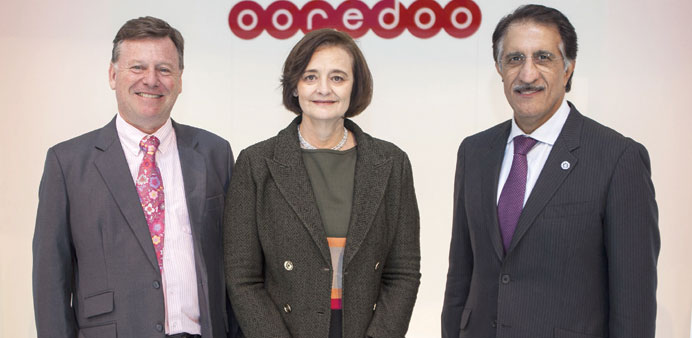|
Ooredoo yesterday announced the on-going extension of its award-winning mWomen programme, which aims to use mobile technology to empower women across its regional footprint. |
The programme – which has seen remarkable success in markets as diverse as Iraq, Indonesia, Qatar and Algeria – has received significant international attention in recent years, and has been expanded to include Ooredoo’s latest market, Myanmar.
Ooredoo Myanmar announced that it is the latest recipient of an Innovation Fund grant from the GSMA Foundation, to support the launch of a multi-tier maternal health service in partnership with a range of local and international partners.
The service, which will draw upon Ooredoo’s expertise in delivering information-based mobile services for women, will provide access to maternal healthcare information via mobile devices free-of-charge.
Myanmar currently faces a number of issues related to maternal health, including a high infant mortality rate and challenging levels of baby malnutrition, and more than 70% of births occur outside a professional medical service.
This first-of-its-kind service will offer medically-proven content to women, as well as direct channels for users to contact medical professionals about specific health issues and seek treatment as required.
Dr Nasser Marafih, Group CEO, Ooredoo, said: “We believe every woman should have an equal opportunity to use a mobile phone. Ooredoo has developed a lot of experience in delivering mobile services for women across our footprint, particularly from pioneering operations like Asiacell and Indosat.
“We work with content experts, NGOs and leading developers to ensure that the information is accessible, relevant and tailored for women’s needs. We are now able to develop a cutting-edge service that tackles a vital social issue in Myanmar, and are delighted to receive the support of the GSMA Innovation Fund to do so.”
The announcement was made at the ongoing GSMA Mobile World Congress in Barcelona, Spain, where Ooredoo is exhibiting a broad range of innovations and mobile applications, including a host of services to support women’s empowerment.
One of the apps on display at the Ooredoo pavilion is WOBE, the winning app in the mWomen Design Challenge, organised by the GSMA in partnership with USAID and AusAID and Ooredoo.
The contest aimed to redefine the smartphone user experience for resource-poor women in emerging markets. WOBE gives women control over their phone resources, providing prominent airtime and battery management widgets, along with cost-conscious phone sharing and emergency SMS features.
Ooredoo is developing its maternal health service using the experiences and best practice from its other operations around the world.
For instance, Ooredoo’s company in Indonesia, Indosat has developed services like InfoWanita, UsahaWanita and Mentari Aura specifically for women. Info Wanita is an SMS-based application that provides women with free content about finance, children and healthcare. Usaha Wanita, which was developed with the Cherie Blair Foundation for Women, is a mobile web application built for Indonesian women entrepreneurs. For these services, Ooredoo worked with content specialists and local NGOs to assess market needs and source relevant material that would help women in Indonesia.
Mentari Aura is a special package that offers women 24 hours of free mobile phone calls to four family member and friends, as well as free unlimited access to social media and dedicated websites for women, tailored around the communication habits of Indonesian women.
In Iraq, Asiacell, which is part of Ooredoo, researched women’s wants and needs extensively and designed a breakthrough product offering called Almas (‘diamond’) line with features matching the needs of Iraqi women for mobile services.
Since the launch of Almas line in April 2011, more than 2mn female customers have been connected to friends and family, becoming more socially and financially independent, thanks to their access to mobile technology. The proportion of female customers in Asiacell’s customer base has grown from 20% to 40%.

